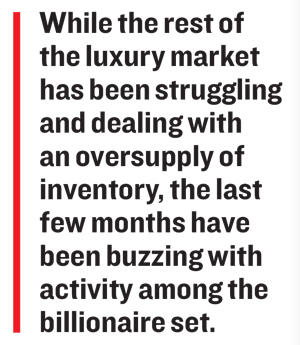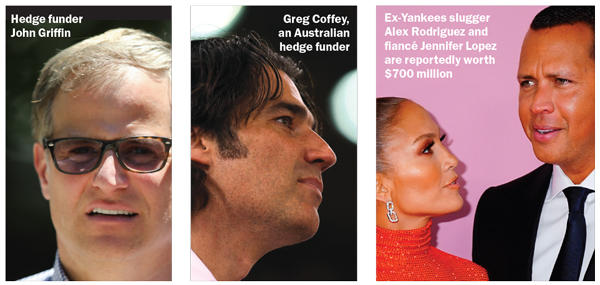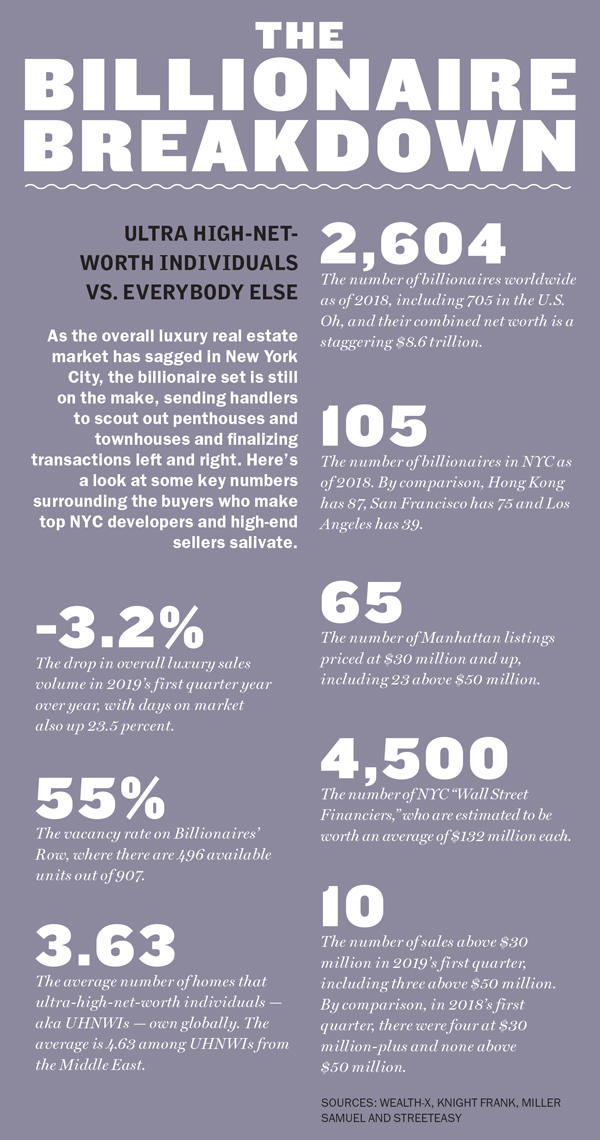Nikki Field felt certain that she’d already laid eyes on the buyer of the penthouse at 212 Fifth Avenue.
Looking with a forensic lens at her sign-in sheet last May, the Sotheby’s International Realty agent calculated that uber-wealthy buyers were waiting a minimum of eight months before signing contracts. “I said to Bob Gladstone, ‘There’s going to be no one new,’” she recalled, referring to the founder of Madison Equities, who converted the former manufacturing building into 48 condos with Building and Land Technology and Thor Equities. “We know every buyer,” she told him. “I just have to get them back.”
Roughly a year later, Amazon chief Jeff Bezos agreed to buy three units in the building in a deal totaling $80 million.
There are currently 65 listings in Manhattan that are priced at $30 million or more — not counting the shadow inventory that developers are intentionally holding back, or whisper listings that aren’t officially on the market. That includes 23 properties asking more than $50 million.
While there are roughly 2,600 billionaires worldwide, top brokers in the city said there are only a few dozen uber-wealthy buyers shopping for a New York property at any given time.
“There’s this pool of buyers, and a lot of people know when they’re making the rounds,” said Bess Freedman, CEO of Brown Harris Stevens. “Agents that are in the market all know about these buyers; they’re walking around seeing different product.”
Those in that exclusive club of buyers are surrounded by an army of agents, advisers, attorneys, designers, accountants and others who fiercely guard their privacy and go to great lengths to protect their anonymity.
“My business wouldn’t be what it is if I ever said anything,” said the Corcoran Group’s Hilary Landis, who in 2017 represented the buyer of a $55 million co-op at the Rosario Candela-designed 960 Fifth Avenue. (While Landis remained mum on that buyer’s identity, public records indicate it was Colombian beer heir Carlos Alejandro Pérez Dávila.)
While the rest of the luxury market has been struggling and dealing with an oversupply of inventory, the last few months have been buzzing with activity among the billionaire set. The same week Bezos closed on his pad at 212 Fifth, hedge funder John Griffin paid around $77 million for an Upper East Side townhouse, setting a residential record. Earlier this year, Citadel hedge funder Ken Griffin (no relation) closed on New York’s priciest residential property to date, a $238 million penthouse at 220 Central Park South.
 Douglas Elliman’s Tal Alexander — who represented Griffin in that deal — said the $25 million-to-$30 million market “might be the strongest segment of the market today.”
Douglas Elliman’s Tal Alexander — who represented Griffin in that deal — said the $25 million-to-$30 million market “might be the strongest segment of the market today.”
Even trophy apartments, he said, are being offered at fair prices since sellers and developers acknowledge that it’s a buyers’ market. And buyers with deep pockets are well equipped (and eager) to pounce, particularly after circling a market with ample inventory. “The ultra-rich buy what they want to buy,” agreed Landis. “When they want something, they want something. You’ve got to catch them at the moment.”
“You’re right; I do like this.”
It’s hard to quantify precisely how many ultra-high-net-worth individuals — aka UHNWIs — are shopping for New York real estate at any one time.
According the research firm Wealth-X, the world’s 2,604 billionaires saw their collective net worth drop 7 percent in 2018 year over year. But they were still worth a staggering $8.6 trillion.
The number of U.S. billionaires has inched higher as their counterparts in Asia have weathered slowing global trade and other headwinds. In New York City, there were 105 billionaires in 2018 — overshadowing cities like Hong Kong (87), San Francisco (75) and Los Angeles (39).
Though purchasing luxury real estate is discretionary, owning a portfolio of homes in strong markets around the world is also a way to preserve (and grow) wealth.
In fact, UHNWIs own an average of 3.63 homes, according to Knight Frank’s 2019 Wealth Report.
“The clients I deal with are buying for some kind of hedge against an investment risk they face in another part of the world,” said Peter Rosenberg of Terra Nova Services, a subsidiary of Stonehage Fleming, a U.K.-based wealth management company.
But that reality can also make for interesting timing when it comes to big-ticket purchases.
“When you take the wealthiest people on the planet, they don’t really go for market timing,” said Jeffrey Fields of R New York, who represented the buyer of a $32 million condo at Zeckendorf Development’s 520 Park Avenue. “They’re always shopping; they’re always kicking tires and out there looking. They pull the trigger when it’s right for them.”
Often, that means purchasing something that’s not officially for sale.
Brokers working with UHNWIs are accustomed to making a few well-placed phone calls to find a buyer for an off-market listing.
“You have to understand, when we list those types of properties — both on and off market — the buyer isn’t necessarily someone who’s in the market right then and making offers,” said Ryan Serhant of Nest Seekers International. “A lot of times you have to go find the buyer.”
That was the case with Serhant’s clients who paid eight figures at 520 Park. The “Million Dollar Listing New York” co-star said the couple — prior clients — was living happily on the Upper West Side until he called and said, “I know you probably don’t want to sell, but there’s an amazing new property, you should see it.” He said he sent a car and asked for just 15 minutes of their time. They closed on the $32 million pad in October 2018.

More recently, Serhant pulled off a similar stunt in the Hamptons, where he brought the buyer to natural gas mogul Michael Smith’s Bridgehampton home, which is now in contract for close to the $42.5 million asking price.
“It’s about creating deals at that price point more than finding them,” Serhant said.
In the latter case, Serhant said, he chartered a plane to maximize the client’s time. When the buyer saw the estate, he uttered six words that would be music to any broker’s ears: “You’re right; I do like this.”
The client & the “apparatus”
An analysis of the priciest deals in Manhattan over the past five years shows the wealthiest buyers rely on a web of LLCs, attorneys and money managers to purchase real estate.
This year, when billionaire Ken Moelis plunked down $62 million for a penthouse at 520 Park, the deed was signed by attorney Susan Ly, care of Squar Milner, a Santa Monica-based accounting and financial advisory firm.
Likewise, property records show that when Pérez Dávila — whose family controls SABMiller — bought the $55 million co-op at 960 Fifth in 2017, he did so via Quadrant Capital Advisors, a New York-based fund he co-manages. With offices at 499 Park Avenue, Quadrant has backed hospitality startup onefinestay; Bigfoot Biomedical, a medical tech startup; and others.
Part gatekeepers and part expeditors, money managers often play a crucial role.
“They can build and maintain the trust of clients,” said Sotheby’s Field. “All of these properties are sold through wealth managers. They have the buyers.”
Field, who works with a team of 19, said she strategically hires agents to work with targeted groups of clients. Noticing an uptick of Russian buyers, she said, she just hired an agent who will split her time between New York and Moscow, where she’ll rub shoulders with the advisers and deputies of the ultra-wealthy.
Other brokers said financial advisers often do walk-throughs of properties — or might simply be on call to facilitate deals.
“They are there to free up liquidity,” said Serhant, adding that even the wealthiest buyers don’t have piles of cash lying around. “They move so fast.”
But Douglas Elliman’s Noble Black noted that the “apparatus” of staffers who usually accompany these clients — sometimes based in different countries — can also slow a deal.

“Everyone wants their bite of the apple of this big transaction,” said Black, who last year closed roughly $177 million in deals.
He added, however, that in some cases it’s also “a matter of protecting themselves”: Some clients use their “handlers” more to ensure that “nothing gets screwed up” than to get deals to the finish line.
With that in mind, Stribling & Associates’ Pamela D’Arc said the due diligence that UHNWIs conduct (or that their handlers conduct) is fastidious. Inspections occur into all aspects of the building — from the elevator to the boiler to the property’s debt.
At the Carlton House, an unknown buyer forked over $52 million to purchase the penthouse in 2015 via a shell company, Azalea Holdings LLC. The deed was signed by Stonehage’s Rosenberg.
Rosenberg, who is based in Philadelphia but works with a global clientele, said he generally advises clients to buy property via trusts or LLCs for privacy and estate planning purposes — or as a means of protecting assets and easing the administration of a property after the closing.
“If they’re not living here on the ground in New York, they want someone to be able to deal with the condo board, the building management, caretakers, banks, accountants, decorators and plumbers,” Rosenberg said.
Elliman’s Richard Steinberg, who’s represented Macklowe Properties at 432 Park Avenue and a steady flow of tony Uptown properties, described this tier of buyers as “extremely discerning” and apt to walk away if they’re not satisfied. He’s currently working with two buyers shopping in the $50 million range, and his biggest challenge is finding quality properties.
“You want the best of the best because you can basically afford anything,” he said.
NDA or bust
Before Bezos forked over nearly $80 million at 212 Fifth, the world’s richest man dispatched a team of trusted representatives to vet properties for him. They left no stone unturned, also touring HFZ Capital Group’s XI in West Chelsea as well as the Zaha Hadid-designed 520 West 28th Street.
Like the Amazon chief, other UHNWIs often send interior designers and assistants to scout out properties.
“The incredibly wealthy absolutely just don’t want to waste time,” said Serhant, who recently sold a $43 million estate in the Hamptons to a client who saw the property in person once for “five seconds.”
Before closing the deal, Serhant returned to the house several times, sometimes FaceTiming with his client, who didn’t have time to be there in person.
Other agents also say they’ll do whatever they can to accommodate clients’ often-crazy schedules. “You do not want to waste the time of someone who says, ‘I have one hour on Tuesday,’” said D’Arc.

R New York’s Fields, who was introduced to his last heavy-hitter client through a friend of a friend, said he supplied a list of properties to the client’s assistant, providing notes and analysis in order to narrow down the prospects. Ultimately, the client flew to New York and packed two days with showings. They went through that process several times and looked at roughly 50 properties over a two-year period. “It’s a process of elimination, and sometimes that can take a long time,” Fields said.
Corcoran’s Landis said 95 percent of her business is word of mouth. The New York City native got into brokerage 20 years ago when her children were young and built her network with fellow parents at their private schools.
Like many others, she refused to name names, noting that it’s better for client relations to forgo credit.
But names occasionally leak out via the tabloids or chatty brokers.
Before John Griffin was revealed as the buyer of Philip Falcone’s $77 million townhouse, some believed the buyer was Greg Coffey, an Australian hedge funder who’d been spotted checking out similarly high-end properties in recent months.
Former Yankees slugger Alex Rodriguez and fiancé Jennifer Lopez — who just sold a condo at 432 Park Avenue for $15.75 million — were also reportedly spotted touring a unit at the Puck Penthouses, per the New York Post. Sources told TRD that Brendan Trexler Iribe, co-founder of Oculus, had also been looking at the building.
In the days before Bezos’ deal closed, residents of the building got wind of his purchase and began chattering amongst themselves; those whispers found their way to the brokerage community and ultimately to reporters. When confronted by the Post, Gladstone inexplicably denied the deal, which ended up closing days later.
Barry Landsman, an attorney in the real estate practice of Pryor Cashman who’s worked with many high-profile clients, said he intentionally keeps a low profile. (He’s done just a handful of media interviews over the years.) “They don’t like to see my name in lights. They’re the famous ones,” he said.
“We’ll have NDAs [nondisclosure agreements] with everyone involved — brokers, lender’s attorneys, engineers, interior designers, architects, contractors. Everybody,” Landsman said.
Landsman or his staff have also signed deeds for clients — and they’re not the only one being tapped to do so.
Ken Griffin purchased his record-breaking penthouse via a corporate entity: NYCP LLC. The deed was signed by Molly McEvily, Citadel’s deputy head of communications, who was Griffin’s executive assistant in June 2015, when the contract was signed. The deal was rumor-mill fodder for nearly two years before it closed.
By contrast, tech billionaire Michael Dell kept his name out of the press for several years after buying the $100.5 million penthouse at One57 thanks to a web of NDAs. He was outed by the Wall Street Journal in 2018, four years after the purchase.
Though it’s rare that a nondisclosure will scuttle a deal, D’Arc said she once turned down a client after being asked to sign a particularly onerous agreement. “The idea of having to prove my innocence. Two lawyers read it and they said, ‘I can’t advise you to sign this,’” she recalled.
‘Google-able’ buyers
It’s not just buyers looking at real estate with a discerning eye.
Even in a competitive market, some developers are limiting their buyer pool and erecting velvet ropes at their sales centers.
Vornado Realty Trust’s Steve Roth notoriously vetted buyers personally at 220 Central Park South, popping into the sales office to chat up unsuspecting prospects.
Russian billionaire Vladislav Doronin — whose OKO Group is converting the upper floors of the Crown Building into condos — recently disclosed to the Journal that buyers at the Crown are screened before they can enter the sales office.
When screening is conducted, buyers are often asked to provide a litany of documents and to give the liquid sum of their accounts. Some would-be buyers refuse — or expect their cachet to excuse them from such exercises.
Still, “most of the people in this caliber are Google-able,” D’Arc said. She noted, however, that if a screening process is in place, fair housing rules mandate that the same process be applied to everyone.
One source, who declined to be named, described a discerning vibe that’s spread to some new condos. The source said some developers have an unspoken preference for wealthy domestic buyers, who may not be as vulnerable to the global economic turmoil impacting Chinese, Russian and other foreign buyers.
That turmoil is undoubtedly driving some away, according to Steinberg. “Part of it is absolutely because of politics,” he explained. “They don’t want to invest in an economy where politics has come into play.”
There’s also a smaller number of buyers from abroad now. Over the last five years, foreign buyers have gone from representing a third of the Manhattan condo market to making up merely a fifth, according to appraisal firm Miller Samuel.
For the flush U.S. buyers, “you’re dealing with real wealth,” said Elliman’s Black, noting that either their family name or history is readily apparent or that they’re in finance or technology.
According to Wealth-X, there are more than 4,500 “Wall Street Financiers” in New York City, estimated to be worth an average of $132 million each.
In addition, the seven most valuable companies globally are tech firms, and six of the world’s 10 richest people earned their wealth through tech. “The technology business has brought a whole new set of people into this financial group,” said D’Arc. “And they gravitate towards a [pied-à-terre] or home in New York.”
